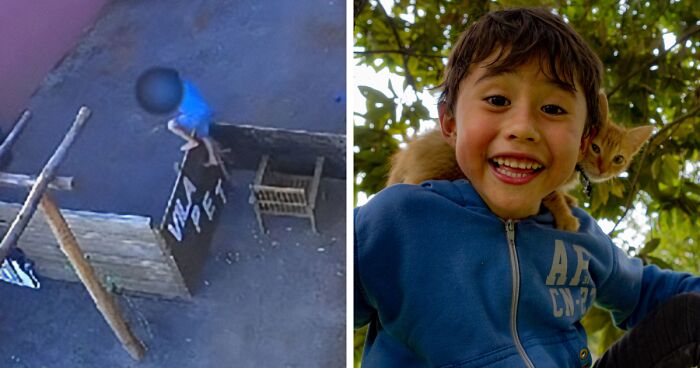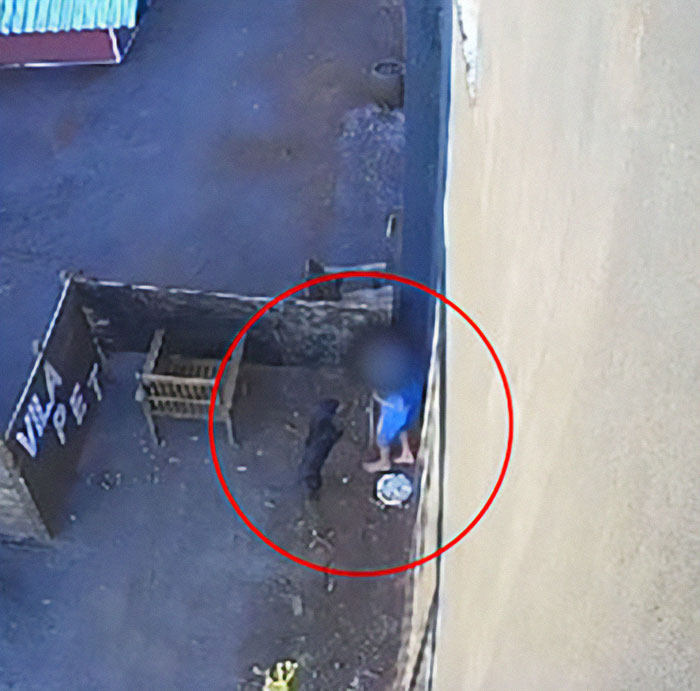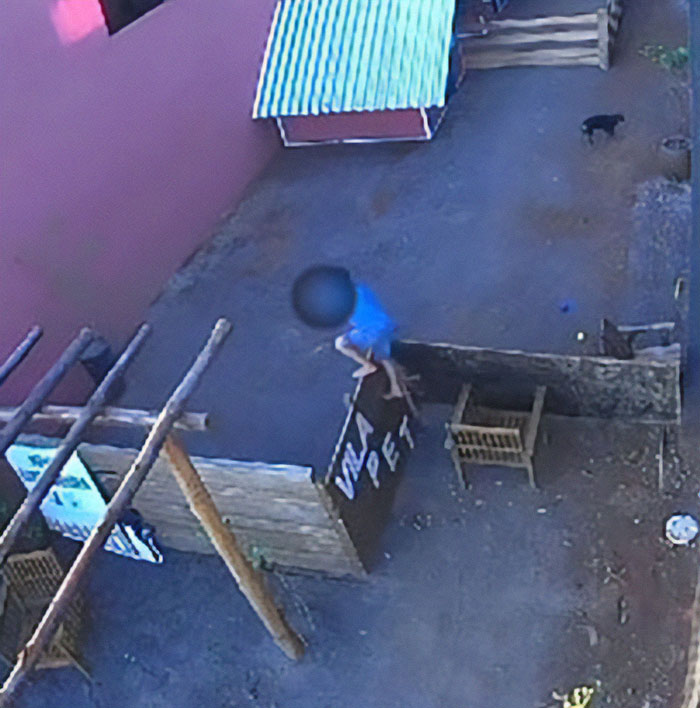
“Tragic Story”: After 9YO Brutally Attacked 23 Animals, Psychopathy Expert Debunks Myths
Interview With ExpertThe age-old debate of nature versus nurture when it comes to psychopathy has gained renewed relevance following the shocking killing of more than 20 pets by a 9-year-old last month.
The incident, which took place on October 13 in Paraná, Brazil, had netizens worldwide calling for the child’s arrest after camera footage surfaced of the boy ending the lives of 20 rabbits and three guinea pigs with his bare hands after breaking into a veterinary hospital in Brazil.
- Child psychopathy is treatable with early intervention.
- 9-year-old killed 23 animals, sparking online outrage.
- Parents must be actively involved in child's therapy.
- Correctly diagnosing psychopathy is crucial for treatment.
“There is no treatment for psychopaths. This kid should be incarcerated for life,” wrote one reader, echoing similar comments from hundreds of viewers who believed the boy’s condition to be irreversible.
To finally understand whether child psychopathy can be cured—and how—Bored Panda spoke with PhD. Abigail Marsh, an author and neuroscience professor at Georgetown University, who categorically denied the notion of psychopathy being incurable.
A Neuroscientist explained how child psychopaths can be treated, citing early intervention as the critical factor in helping them lead a healthy life
Image credits: cnnbrasil
“All psychological disorders are associated with changes in the brain, but that doesn’t mean they can’t be treated,” Marsh explained. “Some treatments make a significant difference in symptoms and outcomes.”
Neuroscientists have long debated whether the disorder is the result of factors predetermined by genetics or if it is the environment in which the individual grows that precipitates their antisocial tendencies.
For instance, a 2015 study by the University of New Mexico described psychopathy as being “neurodevelopmental,” that is, a result of physical differences in the brain.
Dr. Kent Kiehl also stated in an article for Yale University that “there is no cure for psychopathy” after discovering in 2012 that these individuals have reduced brain matter in the paralimbic system, which is responsible for processing emotions.
Image credits: cnnbrasil
“This is not surprising,” Marsh said when presented with these studies. “A large corpus of research has found that genetics account for about half the variation in many psychological outcomes.”
Despite this, Marsh explained that early detection and treatment are the difference between a kid growing up to become a full-fledged psychopath who hurts those around them and becoming a productive, responsible adult.
“We know that early screening, diagnosis, and treatment can dramatically shift the trajectory of children with neurodevelopmental conditions such as autism,” she stated. “Recent analysis found that the same is true for child psychopathy.”
Fearless temperament, less motivation to seek positive rewards, cruelty to animals, and a lack of interest in the emotions of others are some of the signs to look for
Image credits: Abigail Marsh/TED Talk
But how can a parent detect if their child is at risk of becoming a psychopath? For Marsh, the best way is to look at their behavior and how they react to things that would generally bring joy to a child, such as rewards or treats.
“The earliest signs of risk for psychopathy include a fearless temperament—not seeming scared of things other children are scared of, not learning from punishments like time-outs—and being less motivated by positive social rewards,” Marsh explained.
According to her, hugs and cuddles mean little to a child psychopath, and they are also less capable of discerning the emotions of others.
Image credits: JR-50/stock.adobe.com (Not the actual photo)
“Children at risk for psychopathy pay less attention to others’ faces and eyes,” she added, urging parents to employ a holistic approach when looking for signs, as some can also be observed in children with autism.
For the professor and author, the issue isn’t that children at risk of psychopathy can’t be treated; it’s that they are not being treated at all.
“It’s tragic,” Marsh reflected. “The biggest problem is that way too few children are getting screened and diagnosed, and even if they are correctly diagnosed, only about half ever receive any treatment.”
For treatment to be effective, parents need to be just as involved, if not more, as the child at risk of psychopathy themselves
Image credits: JorgeAndres/stock.adobe.com (Not the actual photo)
Image credits: Michaela/stock.adobe.com (Not the actual photo)
After accurately diagnosing a child with the disorder, the next step involves the crucial participation of their parents or guardians.
“The treatments with the best evidence backing them are forms of psychotherapy in which a therapist works with the parents to teach them techniques to correct their child’s behavior,” Marsh explained.
“Just sending a young child to therapy is often not very effective because they don’t have the skills or self-regulation to implement therapeutic techniques on their own,” she added, stressing that it is the parents who need to be trained since they will be the ones responsible for delivering the therapy.
“The treatments that seem to be the most effective include Parent-Child Interaction Therapy (PCIT) and Parent Management Training (PMT),” the doctor said. “Parents of kids with psychopathic traits should find a local clinician trained in one of these kinds of treatment.”
When it comes to medications such as stimulants, mood stabilizers, and antipsychotics, Marsh stated that while they can be helpful, they should only be used as adjuvants to therapy.
Marsh warned not to use the term “psychopath” for people with antisocial personality disorder, explaining that, while similar, they are ultimately different diagnosis
Image credits: victhepath
Image credits: victhepath
In conjunction with the story of the Brazilian kid who assaulted the veterinary clinic, we also presented Dr. Marsh with the testimony of Vic, a TikTok influencer who goes by the handle @victhepath, whose profile is entirely dedicated to her experiences “growing up as a child psychopath.”
While several of Vic’s videos have reached more than three million views due to the controversial nature of labeling oneself as a psychopath, her diagnosis was—in her own words—antisocial personality disorder (ASPD), an entirely different condition, according to Marsh.
“There is a lot of overlap between the two. Most people with a diagnosis of ASPD will also have high levels of psychopathic traits,” the doctor stated. “But a diagnosis of ASPD focuses more on behavior, like engaging in criminal activities, aggression, and deceit. Psychopathy is a personality disorder.”
@victhepath Do y’all think I’m crazy bc I really don’t know😂 #psychopathy#aspd#antisocialpersonalitydisorder#femalepsychopath#aspdawareness#psychopathdiary#highfunctioningpsychopath#chroniclesofapsychopath#psychopath#psychpathyspectrum♬ original sound – Vic Path
Marsh went on to explain that people with psychopathy can learn to regulate their behavior such that they would not qualify for a diagnosis of ASPD.
“The most common error people make is assuming that someone with psychopathic traits is committing serious crimes or is very violent. That’s not necessarily true,” Marsh explained.
“Just like a person with an introverted personality can still learn to socialize more if they are motivated to, a person with psychopathy can learn to behave more prosocially if they are motivated to.”
Although psychopathy is frequently linked to violence in pop culture, it is not the disorder most strongly linked with extreme acts of aggression
@victhepath I didn’t expect to have an emotional trigger today but I’m glad I did because it helps me get closer to my goals. When I don’t have any feelings I forget that there are things I want to work towards #emotionalintelligence#psychopath#shadowwork♬ original sound – Vic Path
Marsh stressed the importance of not jumping to conclusions when labeling people who act violently or cruelly, especially when they are children.
When analyzing the case of the 9-year-old who brutally murdered 23 animals, the doctor explained that there is more than one kind of psychological disorder that can increase the risk of violence.
“For example, people with schizophrenia are seventeen times more likely to commit homicide than a typical person, which is one reason it is so vital to provide support and treatment to reduce their symptoms,” she explained.
Image credits: fizkes/stock.adobe.com (Not the actual photo)
“Without knowing if this child was experiencing psychosis or another problem, it is hard to say [if he is a psychopath].”
The gruesome nature of the incident stunned the doctor, “[It’s] a tragic story.”
“Behavior like this is not typical at all, even for children with psychopathic traits,” she added. “A child like this could certainly have benefited from an early, accurate diagnosis and aggressive treatment.”
Due to being a 9-year-old, the Brazilian child was not criminally responsible for his actions according to that country’s law, and it is unclear whether he’ll be able to receive the help he needs. Marsh recommended “residential therapy” in his case, due to the level of violence demonstrated and the apparent inability of his parents to safely manage it.
Dr. Marsh mentioned the dangers of her peers misdiagnosing children on purpose to avoid the stigma of being labeled as psychopaths, as it can lead to ineffective treatments
Image credits: NKDO
Finally, we asked Marsh about the ethical implications of diagnosing children with psychopathy early in life due to the stigma that the term carries. According to her, families are often more concerned about getting a correct diagnosis and treatment rather than stigma.
“What families want is clinicians to be straight with them,” she said. “They know that an aggressive child who steals from people, destroys property, etc., is always going to be stigmatized because those behaviors are (correctly) stigmatized. The label is not the issue.”
Marsh said that she has known of cases where some of her peers have deliberately given incorrect diagnoses, fearing that the truth may damage the child due to stigma. “If you diagnose a child with psychopathic traits as autistic or depressed, they will get funneled into therapies that won’t help them,” she said.
Image credits: zilvergolf/stock.adobe.com (Not the actual photo)
The doctor stressed that, while genetics may predispose some children to psychopathy, timely, appropriate, and accurate treatment can prevent the worst outcomes, turning someone who may otherwise become a danger to themselves and others into a healthy, functioning adult who can enrich those around them.
“In my experience, that is what individuals and families affected by psychopathy want clinicians to be focusing on, not stigma.”
Those interested in Dr. Abigail Marsh’s work can visit her website, https://disordersofaggression.org/, and check out her books Good For Nothing and The Fear Factor, which in-depth discuss the topic of psychopathy.
Poll Question
Thanks! Check out the results:
Explore more of these tags
Regarding the poll: it doesn’t matter what I think and probably not what the majority of us on BP think. It matter what the experts think because they’re the experts.
Absolutely. That's a fair shout. Asking non experts is not going to change facts.
Load More Replies...Most of this comment section is way out of line. This is not a topic for opinions and emotions but for serious research by professionals and not wannabe scientists led by emotions and socialmedia algorithms
Kudos for her comment that any therapy sessions need to be backed up by the parents, the kids need assistance at home implementing the things they've learned in therapy. My grandmother wouldn't acknowledge I was in therapy, wouldn't even ask me if it was helping, walked myself back and forth to appointments on my own at 14, if I tried to talk to her about anything from my therapy she would deny my trauma and claimed I was making it all up and whining, that my memories were fake and it was embarrassing for her to have a child in therapy as it reflects on her not being a fit parent in front of the neighbors. Keeping up appearances was all that mattered. Was anyone else raised by a Hyacinth Bucket too? (British joke only old farts will get).
Not related to the majority of your comment. 'Keeping up with appearances' was one of the first UK comedies I fell in love with. My wife refers to her her mother as Hyacinth because of that show. But you are right. I had a very supportive family behind me that were willing to do whatever the therapist said, even if they didn't fully understand why. It made a huge difference.
Load More Replies...Regarding the poll: it doesn’t matter what I think and probably not what the majority of us on BP think. It matter what the experts think because they’re the experts.
Absolutely. That's a fair shout. Asking non experts is not going to change facts.
Load More Replies...Most of this comment section is way out of line. This is not a topic for opinions and emotions but for serious research by professionals and not wannabe scientists led by emotions and socialmedia algorithms
Kudos for her comment that any therapy sessions need to be backed up by the parents, the kids need assistance at home implementing the things they've learned in therapy. My grandmother wouldn't acknowledge I was in therapy, wouldn't even ask me if it was helping, walked myself back and forth to appointments on my own at 14, if I tried to talk to her about anything from my therapy she would deny my trauma and claimed I was making it all up and whining, that my memories were fake and it was embarrassing for her to have a child in therapy as it reflects on her not being a fit parent in front of the neighbors. Keeping up appearances was all that mattered. Was anyone else raised by a Hyacinth Bucket too? (British joke only old farts will get).
Not related to the majority of your comment. 'Keeping up with appearances' was one of the first UK comedies I fell in love with. My wife refers to her her mother as Hyacinth because of that show. But you are right. I had a very supportive family behind me that were willing to do whatever the therapist said, even if they didn't fully understand why. It made a huge difference.
Load More Replies...
 Dark Mode
Dark Mode 

 No fees, cancel anytime
No fees, cancel anytime 




























































21
61